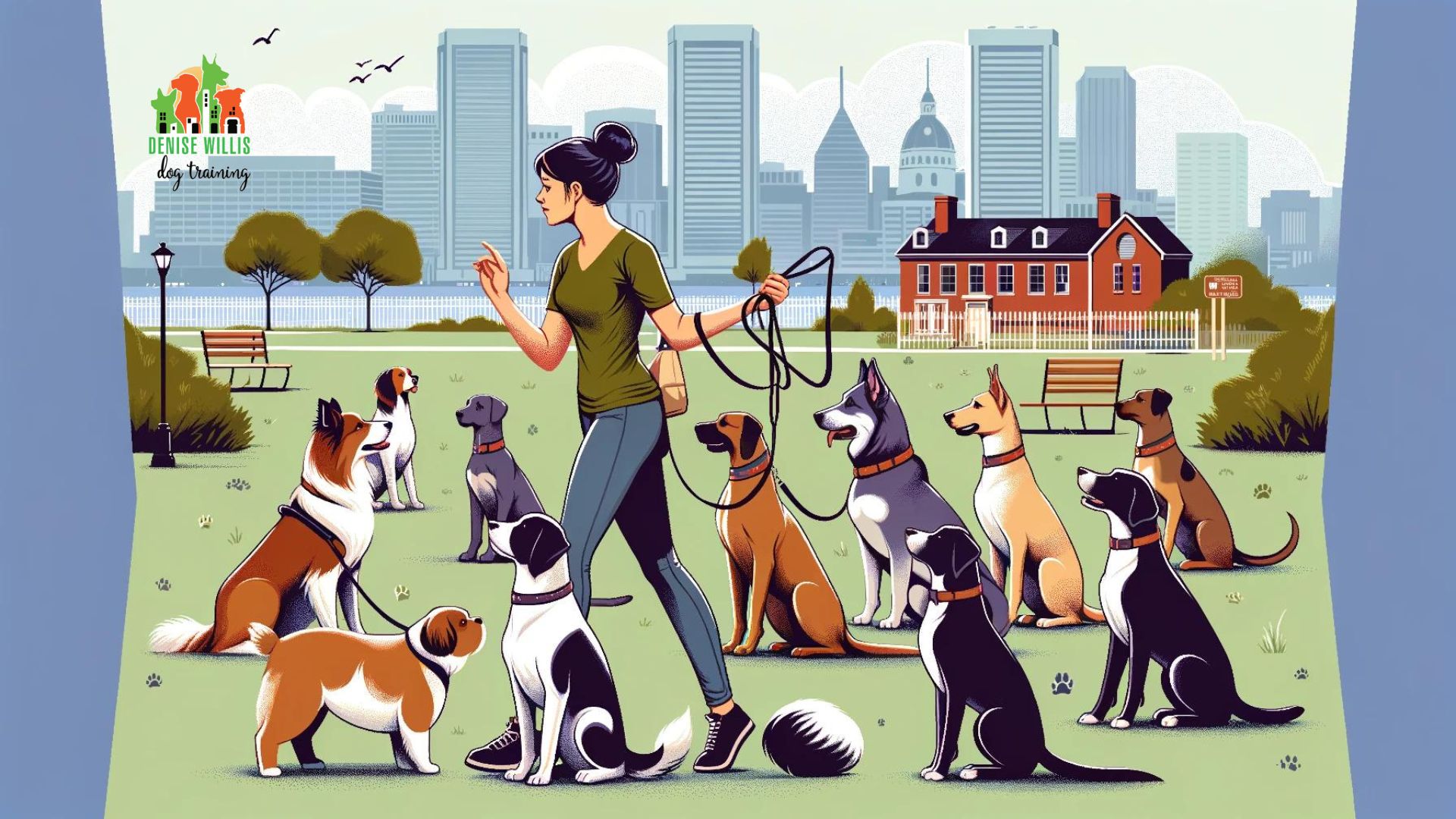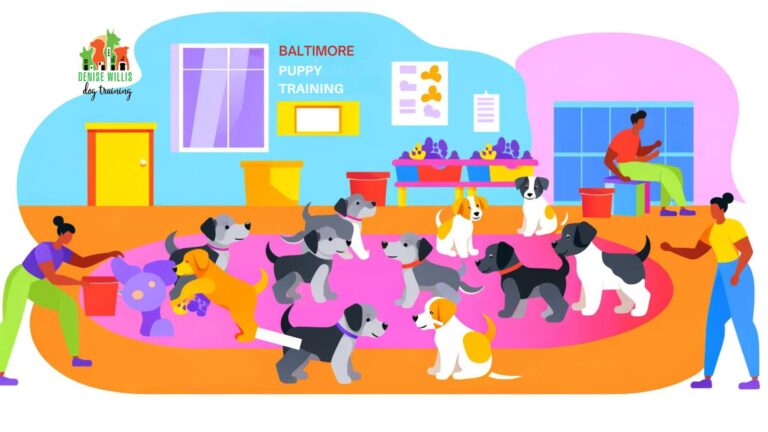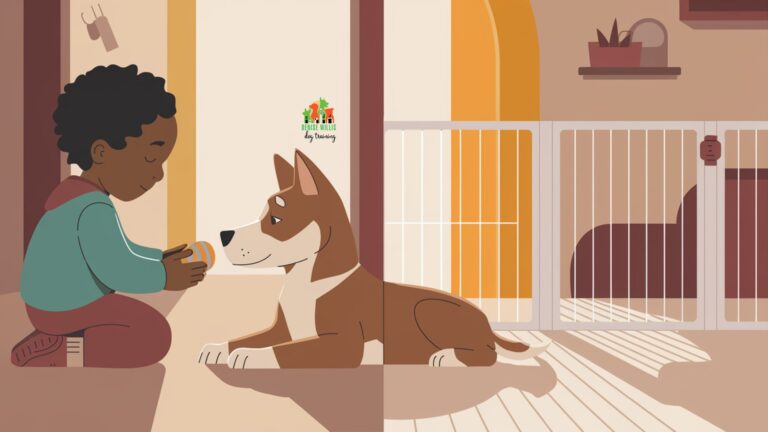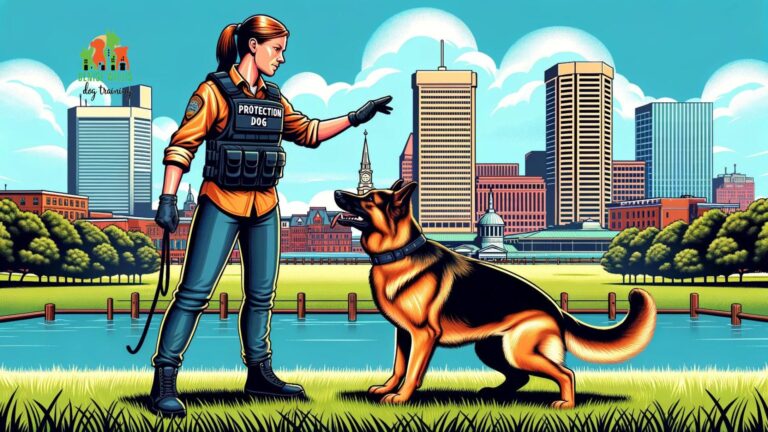Therapy Dog Training in Baltimore: A Guide to Transforming Your Pet into a Healing Companion
📍 Service Area Notice: DW Dog Training provides in-person training services exclusively in the Greater Baltimore area. While our blog content is designed to help dog owners internationally, our hands-on training services are locally focused. For readers outside our service area, we hope you find value in our articles and welcome you to reach out with questions!
Ever wondered how your furry friend could become a certified therapy dog in Baltimore? Transforming your pet into a healing companion is an incredibly rewarding journey, but it’s not as simple as slapping a vest on Fido and calling it a day. As a professional dog trainer with years of experience, I’ve seen firsthand the magic that happens when a well-trained therapy dog connects with someone in need. But before we dive into the nitty-gritty of training, let’s start with the basics: what exactly is a therapy dog, and how do they differ from your average cuddle buddy?
What is a Therapy Dog?
When I first started my journey as a dog trainer, I had no idea how much of an impact therapy dogs could have on people’s lives. It wasn’t until I witnessed the magic firsthand that I truly understood the power of these incredible animals.
Therapy dogs are more than just friendly pets; they are specially-trained canines that provide comfort, affection, and emotional support to people in various settings. Unlike service dogs, which are trained to perform specific tasks for individuals with disabilities, or emotional support animals, which provide companionship to their owners, therapy dogs work with their handlers to interact with and bring joy to a wide range of people.
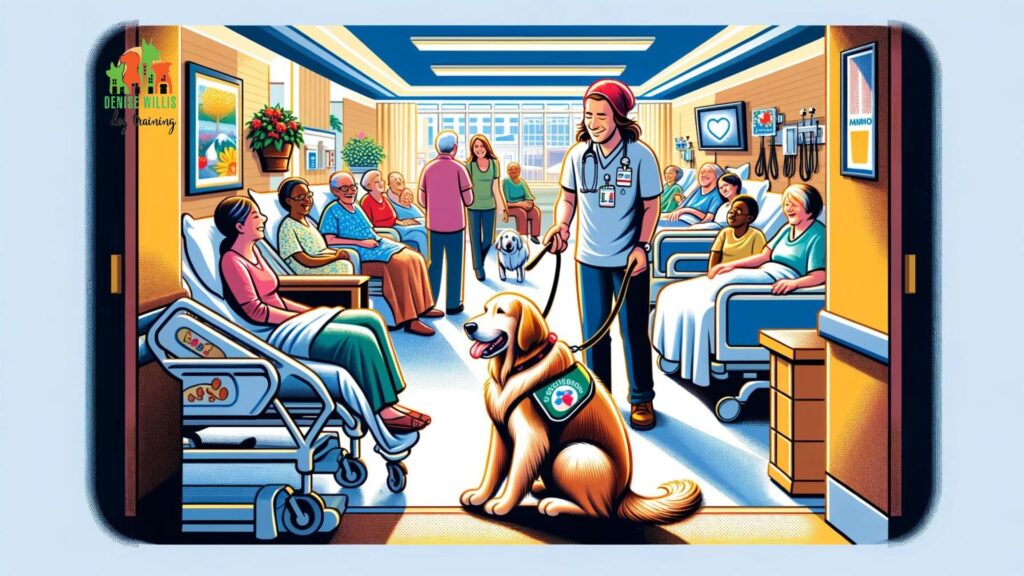
The Power of Therapy Dogs
As a trainer, I’ve witnessed firsthand the incredible impact that therapy dogs can have on the people they interact with. It’s not just about the wagging tails and the soft, fluffy fur (although those certainly don’t hurt!). It’s about the way these special animals seem to instinctively know how to comfort and connect with people who are struggling.
Take, for example, the story of a veteran struggling with PTSD who found solace in the presence of a therapy dog during a hospital stay. Or the child with autism who spoke his first words after bonding with a gentle golden retriever. These may sound like something out of a movie, but for those of us in the therapy dog world, they’re the kinds of stories we hear every day.
And it’s not just anecdotal evidence, either. Studies have shown time and time again that interacting with therapy dogs can have measurable benefits for both physical and mental health. From reducing stress and anxiety to lowering blood pressure and even improving cardiovascular health, these furry healers have a way of making everything feel just a little bit better.
Of course, it’s not all sunshine and rainbows. Therapy dog work can be emotionally taxing, both for the dogs and their handlers. But at the end of the day, the rewards far outweigh the challenges. Knowing that you’ve made a real difference in someone’s life, even if just for a moment, is a feeling like no other.
Why Baltimore?
As a proud Baltimorean, I know firsthand the struggles and triumphs of this incredible city. From the hardworking healthcare professionals in our hospitals to the resilient students in our schools, Baltimore is full of people who could benefit from the healing power of therapy dogs.
At DW Dog Training, we are committed to helping the people of Baltimore by training and certifying exceptional therapy dog teams. We believe that every person deserves the opportunity to experience the joy and comfort that a therapy dog can bring, and we are dedicated to making that a reality.
Requirements for Therapy Dogs
Alright, so you’re convinced that therapy dog work is the path for you and your furry friend. But what exactly does it take to become a certified therapy dog team? As a trainer, I’ve seen countless dogs come through my doors, each with their own unique personality and quirks. But there are a few key requirements that every potential therapy dog must meet.
Basic Temperament
Not every dog is cut out to be a therapy dog, and that’s okay! As a trainer, one of my most important jobs is to help identify which dogs have the right temperament for this special role. The ideal therapy dog is friendly, outgoing, and confident, with a calm and patient demeanor. They should be adaptable to new situations and enjoy human interaction.
I always tell my clients that their dog’s personality is the foundation for success as a therapy dog. No amount of training can transform a shy or anxious dog into a social butterfly, but with the right temperament, any dog can learn to bring joy and comfort to those who need it most.
Basic Obedience Skills
Of course, a great personality isn’t enough on its own. To be a successful therapy dog, your furry friend will need a solid foundation of obedience skills. At DW Dog Training, we work with our therapy dog candidates to master essential commands like sit, stay, down, and come. We also focus on loose-leash walking and polite greetings, as these skills are crucial for navigating the various environments therapy dogs may encounter.
I often remind my clients that obedience training isn’t just about getting your dog to follow commands; it’s about building a bond of trust and communication between dog and handler. When you and your dog work together as a team, you’ll be better equipped to handle any situation that comes your way.
Behavioral Requirements
In addition to basic obedience, therapy dogs must possess a specific set of behavioral skills. They should be comfortable being touched and handled by strangers, as this is a common occurrence during therapy visits. They must also be able to remain calm in unusual or chaotic environments, such as hospitals or nursing homes.
One of the most important behavioral requirements for therapy dogs is the ability to ignore distractions. Whether it’s a dropped piece of food or another dog walking by, a therapy dog must be able to stay focused on their handler and their job. At DW Dog Training, we use positive reinforcement techniques to help dogs develop this essential skill.
Age and Health Requirements
When it comes to therapy dog work, age is more than just a number. Most organizations require therapy dogs to be at least one year old, as this allows time for them to mature physically and emotionally. However, there’s no upper age limit for therapy dogs, as long as they remain in good health and enjoy their work.
Speaking of health, therapy dogs must be up-to-date on all vaccinations and receive regular check-ups from a veterinarian. This ensures that they are not only healthy enough to participate in therapy visits but also that they are not putting any clients at risk of illness.
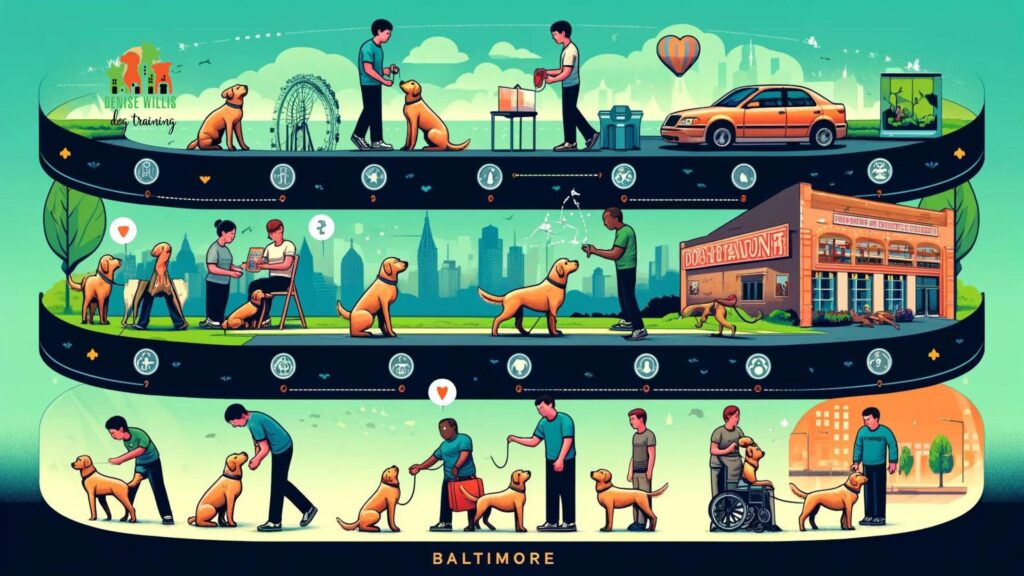
Choosing a Therapy Dog Training Program in Baltimore
So, you’ve got a dog with the right temperament and a heart full of love to share. Now what? The next step is finding a top-notch therapy dog training program to help you and your furry friend develop the skills you need to succeed.
What to Look For in a Trainer
When it comes to choosing a therapy dog training program in Baltimore, the most important factor is the trainer. As an experienced trainer myself, I know how crucial it is to find someone who not only has the knowledge and skills to train your dog but also the passion and dedication to help you succeed.
At DW Dog Training, we pride ourselves on our commitment to positive reinforcement training methods. We believe that building a strong, trusting relationship between dog and handler is the key to success, and we use scientifically-proven techniques to help our clients achieve their goals.
What to Expect from the Training Program
Therapy dog training is not a one-size-fits-all process. At DW Dog Training, we offer a variety of training options to fit the unique needs of each dog and handler team. Whether you prefer group classes, private sessions, or a combination of both, we will work with you to create a personalized training plan.
Our programs typically involve weekly or bi-weekly training sessions, where we focus on building essential skills and preparing for real-world therapy scenarios. We also provide homework and practice exercises to help you and your dog continue learning and growing between sessions.
One of the things that set our training program apart is our focus on gradual exposure to different environments and stimuli. We believe that the best way to prepare a therapy dog for success is to help them become comfortable with a wide range of situations, from the chaos of a busy hospital to the quiet of a library reading room.
The Therapy Dog Training Process
Alright, so you’ve found the perfect trainer and you’re ready to dive into therapy dog training. But what exactly does that process look like? As a trainer, I can tell you that it’s not always a straight line from start to finish. Every dog is different, and every handler brings their own unique strengths and challenges to the table.
Initial Evaluation
The first step in any therapy dog training journey is an initial evaluation. At DW Dog Training, we use this opportunity to assess your dog’s temperament, obedience skills, and potential for therapy work. We’ll observe how your dog reacts to various stimuli, such as sudden noises or unfamiliar objects, and provide feedback on areas where they may need additional training.
This evaluation is not a pass-or-fail test but rather a way for us to get to know your dog and create a tailored training plan that addresses their specific needs. It’s also a chance for you to ask questions, voice concerns, and learn more about the therapy dog training process.
Training Focus
Once we’ve completed the initial evaluation, the real work begins! Our therapy dog training program focuses on building a strong foundation of obedience skills while also preparing dogs for the unique challenges of therapy work.
In addition to practicing basic commands like sit, down, and stay, we work on more advanced skills such as remaining calm in distracting environments and being comfortable with handling by strangers. We also simulate real-world therapy scenarios, such as navigating through hospital equipment or interacting with individuals who may have limited mobility.
Throughout the training process, we emphasize the importance of positive reinforcement and building a strong bond between dog and handler. We believe that the most successful therapy dog teams are those who work together seamlessly, with trust and understanding on both sides.
Certification/Registration
The final step in the therapy dog training process is certification or registration with a recognized therapy dog organization. At DW Dog Training, we prepare our clients for this process by ensuring that their dogs have mastered all necessary skills and are ready to pass the certification test.
Different organizations have different requirements for certification, but most involve a simulated therapy visit where the dog and handler must demonstrate their ability to work together effectively. This may include tasks such as navigating through a crowd, remaining calm during a medical procedure, or providing comfort to an individual in distress.
Once your dog has passed the certification test, you’ll be ready to start making a difference in the lives of others as a certified therapy dog team. And of course, we’ll be here to support you every step of the way!
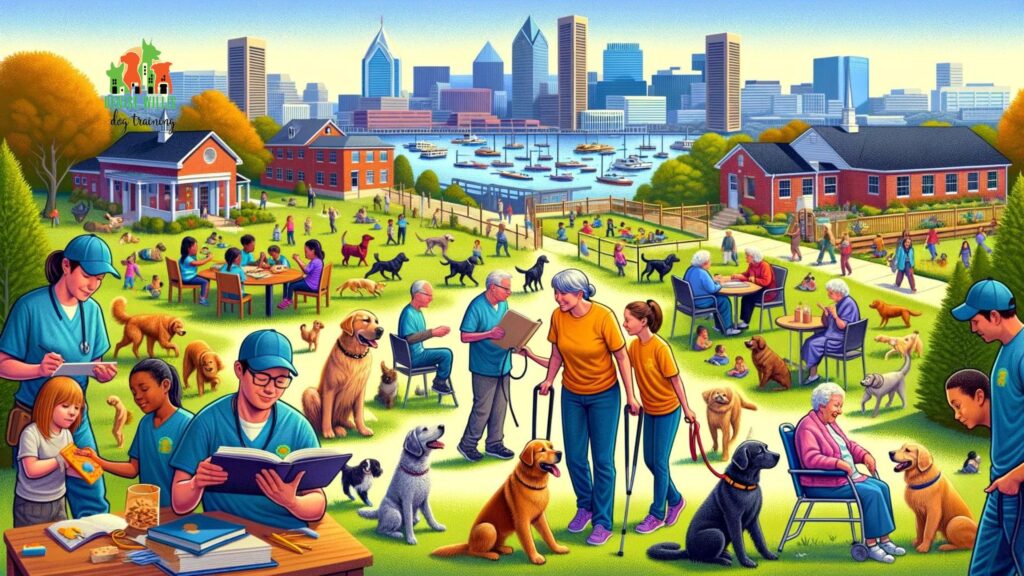
Debunking Myths about Therapy Dogs
Now, before we go any further, I want to take a moment to address some of the common myths and misconceptions about therapy dogs. As someone who’s been in this field for a while, I’ve heard them all – and I’m here to set the record straight.
Myth 1: Any friendly dog can be a therapy dog.
One of the most common misconceptions about therapy dogs is that any friendly dog can do the job. As much as I love all dogs, I know from experience that it takes a special kind of canine to excel in therapy work.
Therapy dogs need more than just a wagging tail and a love of people; they need specific training and skills to help them navigate the unique challenges of working in hospitals, schools, and other settings. They must be able to remain calm in the face of distractions, follow commands reliably, and provide comfort to individuals who may be experiencing physical or emotional pain.
At DW Dog Training, we work closely with each dog and handler team to help them develop these essential skills. We believe that with the right training and support, any dog with the right temperament can become an amazing therapy dog – but it’s not a job for every pup.
Myth 2: Only certain breeds can be therapy dogs.
Another common myth about therapy dogs is that only certain breeds are suitable for the job. I’ve heard people say that only Golden Retrievers or Labrador Retrievers make good therapy dogs, but in my experience, that couldn’t be further from the truth.
At DW Dog Training, we’ve worked with therapy dogs of all shapes, sizes, and breeds. From tiny Chihuahuas to massive Great Danes, we’ve seen firsthand that it’s not about the breed but about the individual dog’s temperament and training.
What matters most is that the dog is friendly, confident, and able to remain calm in a variety of situations. Whether your furry friend is a purebred or a lovable mutt, they have the potential to make a difference in the lives of others as a therapy dog.
Myth 3: Therapy dog work is just about petting and playing.
Finally, I want to address the myth that therapy dog work is all about cuddling and playing. While it’s true that therapy dogs provide comfort and joy to those they visit, their job is so much more than just being a friendly face.
Therapy dogs are trained to provide targeted interventions and support to individuals who may be facing physical, emotional, or mental health challenges. They may work with a child who is struggling to read, providing a non-judgmental listening ear and a calming presence. They may sit with an elderly person who is feeling lonely or depressed, offering a gentle nudge and a wagging tail to brighten their day.
Therapy dog work is about more than just making people feel good; it’s about making a real, lasting difference in the lives of those who need it most. And that takes dedication, training, and a whole lot of heart.
Beyond Training: The Life of a Therapy Dog
Congratulations! You’ve made it through therapy dog training, and you and your furry friend are now a certified therapy dog team. But what happens next? As a trainer and handler myself, I can tell you that the journey doesn’t end when you get that certificate in your hand.
Finding Volunteer Opportunities
So, you’ve completed your therapy dog training and earned your certification – now what? The next step is to start making a difference in your community by finding volunteer opportunities that align with your interests and skills.
At DW Dog Training, we are proud to partner with a variety of organizations throughout Baltimore that are always in need of therapy dog teams. From hospitals and nursing homes to schools and libraries, there are endless opportunities to share your dog’s love and comfort with those who need it most.
We encourage our clients to start by reaching out to organizations that resonate with them personally. Whether you have a passion for working with children or a desire to support veterans, there is a volunteer opportunity out there that’s perfect for you and your therapy dog.
Handler Responsibilities
Of course, being a therapy dog handler is about more than just showing up for volunteer visits. As a handler, you have a responsibility to ensure that your dog is always ready and able to perform their job to the best of their ability.
This means maintaining your dog’s training and skills through regular practice and reinforcement. It also means keeping your dog healthy and well-groomed, with up-to-date vaccinations and regular check-ups with a veterinarian.
As a handler, you’ll also need to be attuned to your dog’s needs and stress levels. Therapy work can be emotionally and physically taxing, and it’s important to know when your dog needs a break or a little extra TLC.
At DW Dog Training, we provide ongoing support and resources to help our therapy dog teams navigate the challenges and rewards of this important work. We believe that by working together, we can create a community of happy, healthy therapy dogs and handlers who are making a real difference in the lives of others.
Self-Care for Handler and Dog
Speaking of the challenges of therapy work, it’s important to remember that self-care is just as important for handlers as it is for dogs. Burnout is a real risk in this field, and it’s essential to take steps to prevent it before it takes a toll on your well-being.
For handlers, self-care may look like setting boundaries around your volunteer schedule, taking time off when you need it, and seeking support from other therapy dog handlers who understand the unique demands of this work.
For dogs, self-care may involve plenty of rest and relaxation between visits, regular exercise and playtime to help them unwind, and lots of positive reinforcement to keep their tails wagging.
At DW Dog Training, we encourage our therapy dog teams to prioritize self-care as an essential part of their work. We believe that by taking care of ourselves and our furry partners, we can continue making a difference in the lives of others for years to come.
The Rewards of Therapy Work
Despite the challenges, there is nothing quite like the rewards of therapy dog work. As a trainer and handler myself, I have seen firsthand the magic that happens when a therapy dog enters a room.
I’ve watched children’s faces light up with joy as they snuggle up to a furry friend, and I’ve seen the tension melt away from a stressed-out college student as they take a moment to pet a wagging tail. I’ve witnessed the power of a gentle nudge and a soft ear to bring comfort to someone who is grieving, and I’ve seen the way a therapy dog can help a person with dementia reconnect with the world around them.
These moments are what makes all the hard work and dedication worthwhile. They remind us of the incredible power of the human-animal bond and the difference that one little dog can make in the lives of so many.
Who Might Benefit as a Handler?
If you’re reading this and feeling inspired to become a therapy dog handler yourself, you may be wondering if you have what it takes. The truth is, therapy dog work is not for everyone – but for those who are called to it, it can be an incredibly rewarding and fulfilling experience.
Therapy dog handlers come from all walks of life, but they tend to share a few key qualities. They are compassionate and empathetic, with a desire to help others and make a difference in their community. They are patient and adaptable, able to navigate the challenges and unpredictability of working with diverse populations. And of course, they love dogs and are committed to building a strong, trusting relationship with their furry partner.
If this sounds like you, then therapy dog work may be the perfect way to give back and make a real impact in the lives of others. And at DW Dog Training, we would be honored to help you and your dog start this incredible journey together.
Cost Considerations
Now, I know what you’re thinking. All of this sounds amazing, but what’s it going to cost me? I get it – as a dog owner myself, I know that we’d all love to give our furry friends the world. But the reality is that therapy dog training is an investment – of time, energy, and yes, money.
Training Program Costs
Of course, as with any specialized training, there are costs associated with becoming a certified therapy dog team. At DW Dog Training, we believe in being transparent and upfront about these costs, so our clients can make informed decisions about their investment.
Our therapy dog training programs typically range from [insert price range], depending on the specific needs of the dog and handler team. This cost covers all training sessions, materials, and support from our experienced trainers, as well as preparation for the certification test.
Ongoing Costs
In addition to the initial training costs, it’s important to factor in the ongoing expenses of maintaining a therapy dog. This may include things like annual veterinary check-ups and vaccinations, high-quality food and treats, grooming supplies, and any necessary equipment like a therapy dog vest or harness.
At DW Dog Training, we believe that the rewards of therapy dog work far outweigh the costs – but we also recognize that it’s important to be realistic about the financial commitment involved. We encourage our clients to budget for these ongoing expenses and to view them as an investment in the health and well-being of their therapy dog partner.
Final Thoughts
Well, folks, we’ve covered a lot of ground today. From the basics of therapy dog training to the myths and misconceptions that surround this incredible field, I hope you’ve gained a better understanding of what it takes to become a certified therapy dog team.
The Power of the Human-Animal Bond
I want to take a moment to reflect on the incredible power of the human-animal bond. Throughout my years as a dog trainer and therapy dog handler, I have witnessed firsthand the way that dogs can transform lives and bring joy, comfort, and healing to those who need it most.
Therapy dogs are a shining example of this bond in action. They are more than just pets; they are partners, healers, and friends. They have the power to break down barriers, ease suffering, and remind us of the goodness in the world.
At DW Dog Training, we are honored to be a part of this incredible work. We are dedicated to helping dogs and handlers throughout Baltimore discover the joys and rewards of therapy dog work, and to making a real difference in the lives of those we serve.
Take the Next Step
If you’ve read this far, then I know that you share our passion for the power of therapy dogs. Whether you’re a seasoned dog owner or a first-time handler, we invite you to take the next step and join us on this incredible journey.
At DW Dog Training, we are here to support you every step of the way. From initial evaluations and training sessions to ongoing support and resources, we are committed to helping you and your dog succeed as a therapy dog team.
So what are you waiting for? If you’re ready to experience the joy, fulfillment, and magic of therapy dog work, then we invite you to contact us today. Together, we can make a difference in the lives of countless individuals throughout Baltimore and beyond.
Learn More
If you’re interested in learning more about therapy dog training and how DW Dog Training can help you and your furry friend get started, we encourage you to visit our website at www.dodgerblue-cheetah-480894.hostingersite.com. There, you’ll find detailed information about our training programs, our experienced trainers, and the many ways that therapy dogs are making a difference in our community.
You can also connect with us on social media to stay up-to-date on the latest news, events, and success stories from our therapy dog teams.
Check us out on Facebook or Instagram.
At DW Dog Training, we believe that every dog has the potential to make a difference – and we’re here to help you unleash that potential. So whether you’re ready to sign up for training today or just want to learn more about this incredible field, we invite you to reach out and join our community of passionate, dedicated therapy dog teams.
Together, we can bring joy, comfort, and healing to those who need it most – one wagging tail at a time.
Key Takeaways
- Therapy dogs are specially trained to provide comfort, affection, and emotional support to people in a variety of settings, such as hospitals, schools, and nursing homes.
- DW Dog Training offers personalized therapy dog training programs in Baltimore, MD, designed to help dogs and handlers succeed as certified therapy dog teams.
- The ideal therapy dog has a friendly, calm, and adaptable temperament, as well as strong obedience skills and the ability to remain focused in distracting environments.
- Therapy dog handlers must be committed to maintaining their dog’s training, health, and well-being, as well as practicing self-care to prevent burnout.
- The rewards of therapy dog work are immeasurable, from bringing joy and comfort to those in need to experiencing the incredible power of the human-animal bond firsthand.
Frequently Asked Questions About Therapy Dog Training in Baltimore
Q: How do I know if my dog would make a good therapy dog? A: The best way to determine if your dog has the potential to be a therapy dog is to schedule an initial evaluation with a qualified trainer, such as those at DW Dog Training. During this evaluation, we’ll assess your dog’s temperament, obedience skills, and overall suitability for therapy work.
Q: How long does therapy dog training typically take? A: The length of therapy dog training can vary depending on the individual dog and handler team, but most programs at DW Dog Training involve weekly or bi-weekly sessions over the course of several months. Our trainers will work with you to create a personalized training plan that fits your schedule and goals.
Q: Can I train my dog to be a therapy dog on my own? A: While it’s possible to teach your dog basic obedience skills on your own, becoming a certified therapy dog team requires specialized training and evaluation by a qualified organization. At DW Dog Training, we have the experience and expertise to guide you and your dog through every step of the process, from initial training to certification and beyond.
Q: What if my dog doesn’t pass the therapy dog certification test? A: If your dog doesn’t pass the certification test on the first try, don’t worry – it’s not uncommon for teams to need additional training or practice before they’re ready to be certified. At DW Dog Training, we’ll work with you to identify areas for improvement and develop a plan to help you and your dog succeed.
Q: How can I get involved in therapy dog work in Baltimore? A: If you’re interested in getting involved in therapy dog work in Baltimore, the first step is to contact DW Dog Training to learn more about our training programs and how we can help you and your dog become a certified therapy dog team. Once you’re certified, we can connect you with volunteer opportunities at local hospitals, schools, nursing homes, and other organizations in need of therapy dog services.

